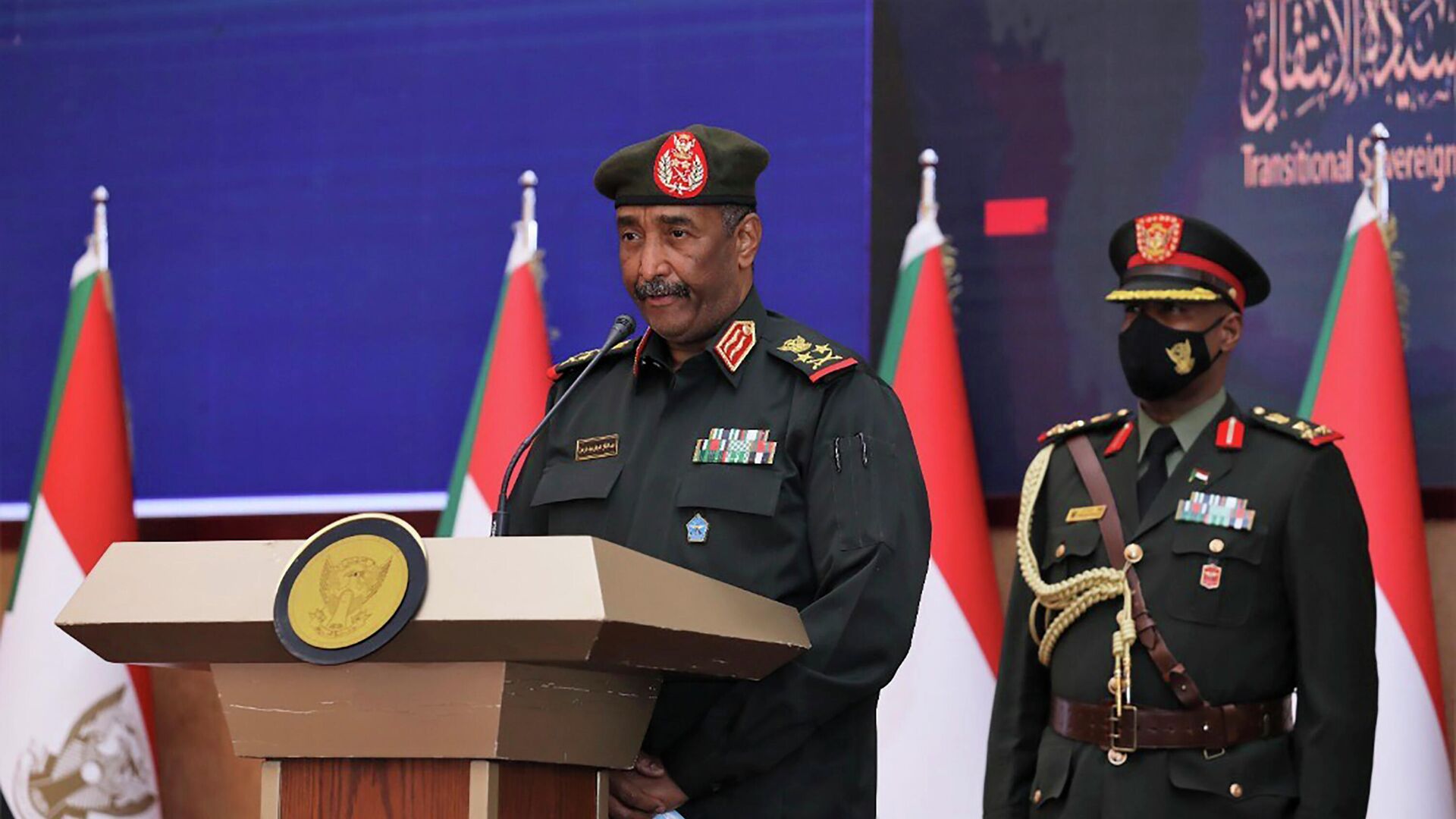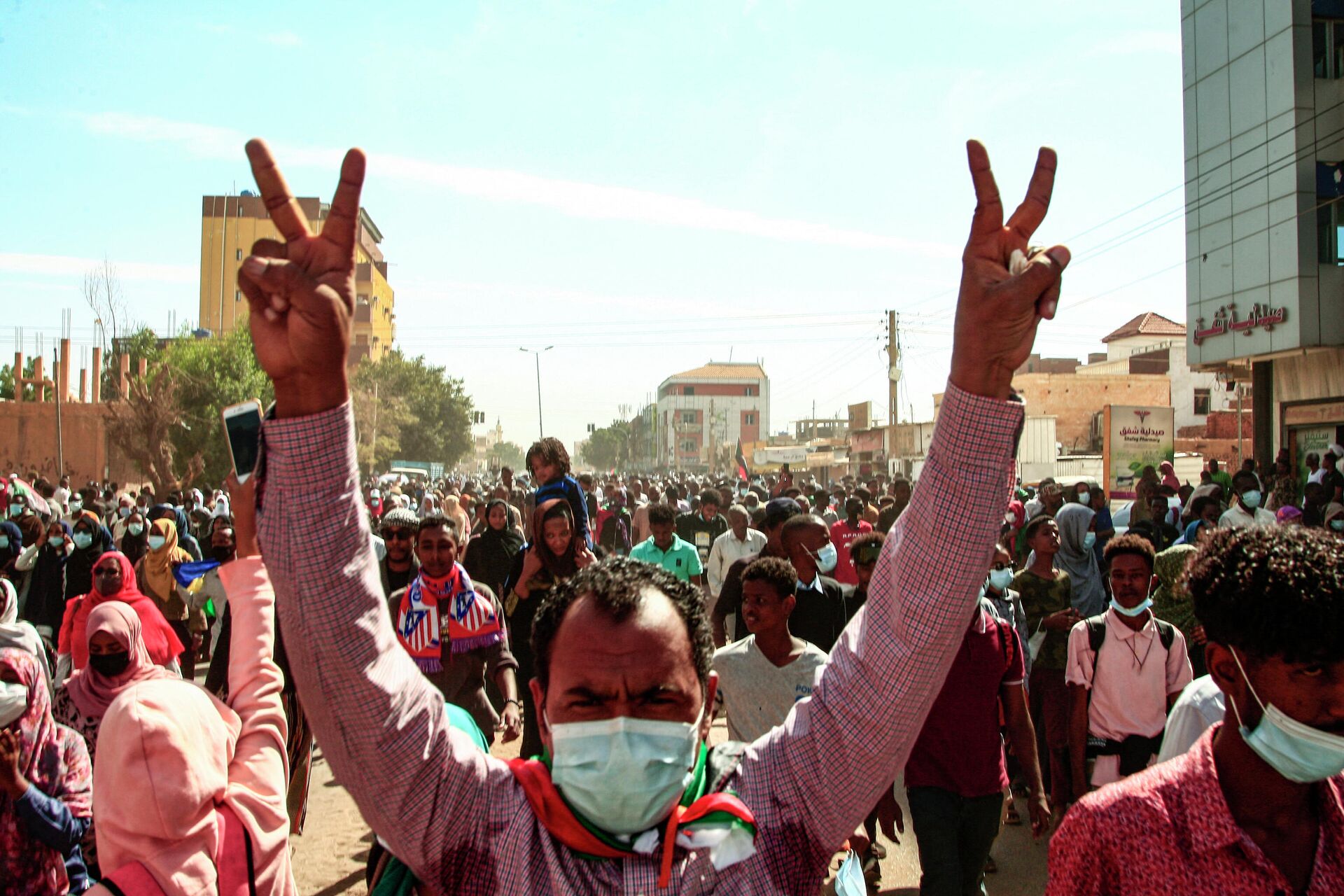‘No Secrecy About This’: Sudan Junta Leader Burhan Admits Security Cooperation With Israel
23:04 GMT 14.02.2022 (Updated: 17:25 GMT 15.01.2023)

© AP Photo / Sudan Transitional Sovereign Council
Subscribe
Saudi Arabia and the United Arab Emirates, two allies of the ousted Sudanese military dictatorship, have long favored stability in Khartoum for political and economic reasons. However, both monarchies unexpectedly came out against the October 25 military coup.
Abdel Fattah al-Burhan, the head of the military junta that seized power in Sudan last October, said on Saturday that his government has been cooperating with Israel.
Burhan told Sudanese state-owned television in his first interview since the October 25 coup that officials from Israel and Sudan have regularly exchanged visits to cooperate on security and intelligence matters.
“We don’t have secrecy about this. But no senior Israeli political official visited Sudan to announce it. All the delegations were from the security services to exchange information,” he said, adding that the information had allowed the country to arrest "many terrorist organizations that could have destabilized the security of Sudan.”
Indeed, reports have emerged in Israeli media about such visits, with the most recent being on Wednesday when Reuters reported that a Sudanese envoy was in Israel. Israel’s Kann News reported late last month during an Israeli visit to Khartoum that because of the visits, “the general impression [in Sudan] is that Israel supports the military and the coup they carried out.”
In fact, Burhan first met with then-Israeli Prime Minister Benjamin Netanyahu in Entebbe, Uganda, at the residence of Ugandan President Yoweri Museveni in February 2020, and agreed to gradually normalize relations, a senior Israeli official told The Times of Israel at the time. Before the end of the year, the Sudanese government signed the Abraham Accords recognizing Israel’s existence as the UAE had done a few months prior. At the time, Burhan chaired the Sovereign Council collective executive that headed Sudan’s transition government, under which Abdalla Hamdok served as prime minister.

Sudanese protesters gather during a demonstration against the October 25 coup, in the capital Khartoum, on January 2, 2022.
© -
On the day of the coup, Israeli daily paper Israel Hayom reported, citing an unnamed Israeli official, that Jerusalem was unhappy with American condemnations of the military’s overthrow of Hamdok and abolition of the Sovereign Council.
"The country is not democratic as it was ruled for 30 years by the authoritarian regime of Omar al-Bashir. While we understand why the US would like to see the democratization of Sudan, between the two Sudanese leaders, it is Burhan who is more inclined to bolster ties with the US and Israel," the official said.
“In light of the fact that the military is the stronger force in the country, and since Burhan is its commander in chief, the events of Monday night increase the likelihood of stability in Sudan, which has critical importance in the region, and it increases the chances of stronger ties with the US, the West, and Israel in particular,” the official added.
Sudan had once been a redoubtable opponent of Israel, including hosting the 1967 Arab League summit in Khartoum, at which the Arab powers pledged to abide by “Three Nos” in their disposition toward Israel: no negotiations, no recognition, and no peace, in the aftermath of Israel’s vast land seizures during the Six-Day War.
Bashir was reviled for his closeness to terrorist groups like *al-Qaeda. Sudan was once on the list of countries targeted for regime change by US neoconservatives, according to divulgences by US Army Gen. Wesley Clark, the former commander of NATO’s forces in Europe. However, the CIA also used Bashir’s government as a convenient source of information on such terrorist groups.
After the revolution that forced Bashir from power in April 2019, Washington gave the new government more explicit support, removing it from sanctions lists and condemning attempts by the military, which is composed largely of Bashir’s old officer corps, to usurp civilian power or crush the democratic mass movement that brought Bashir down.
Since the October coup, Sudanese have been back in the streets with massive demonstrations, calling on the military to yield power to a legitimate civilian and democratic government, but Burhan’s government has not hesitated to use deadly force against them. According to the Central Committee of Sudanese Doctors, 81 people have been killed by the military in demonstrations since October, with two people being killed in a protest on Monday. Sudanese police also said 102 of their officers were also injured in the demonstrations.
*Al-Qaeda: a terrorist group banned in Russia and many other countries.

